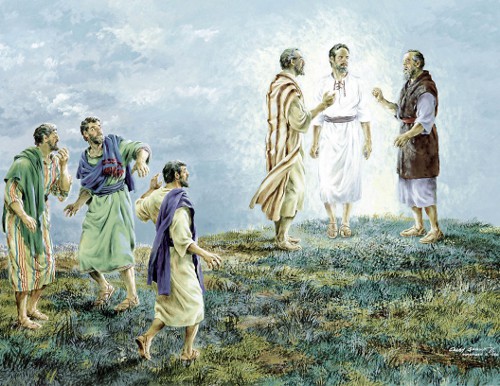Three Simple Letters Will Define Us
In this unique period in which we find ourselves, what three letters represent the supreme authority of the land … W.H.O., C.D.C., or G-O-D?
I have sought to take a commonsense approach to the COVID-19 crisis. I do not need a government mandate to exercise the common sense to wash my hands, not sneeze or cough on other people, and stay home if I am sick. I certainly understand that those who have compromised immune systems need to exercise even greater caution. That is sensible. However, I have been stunned as to how broadly the COVID-19 situation has been imposed on us. At this writing no one knows how this is going to end up and if what we have known as normal is destined to become a thing of the past. Most bothersome to me is not the danger of the virus itself, but rather how quickly some have relinquished the prime authoritative influence in our lives. Dear Follower of Christ, which question below needs the greater consideration? …
Who is our God? or W.H.O. is our God?
God, we know. His sovereign plan provided us with the Scriptures to not only know Him but also navigate through the issues of life. His provision of redemption enables us to have a relationship with the Lord of heaven and earth. Amazing!
Now, what about this influential organization of authority known as WHO? The World Health Organization is not just about virus awareness. It is one of the biggest promoters of abortion and peddlers of radical sex education worldwide. Sharon Slater of Family Watch International exposes this shameful history in a recent publication on WHO. According to Family Watch, “In 2018, WHO co-published with other UN agencies and the help of International Planned Parenthood Federation (IPPF) the radical “International Technical Guidance on Sexuality Education.” This guide purports to set the sexual health education standards for all of the world’s children. Please note that WHO defines “sexuality” to encompass “sex, gender identities and roles, sexual orientation, eroticism, pleasure, intimacy and reproduction,” and thus, WHO supports such controversial topics being taught to children.” 1
This week I watched as the governor of my state unveiled a 3-phase plan to open the territory again. With that plan, another entity is being touted as a primary authority to oversee our lives. In his plan seemingly every level of the free function of our society is at the discretion of the Center for Disease Control. Hmmm, I thought the job of the CDC was to make recommendations not become the arbiter of societal function!
I do not claim to have all knowledge, nor do I claim to have all information in the tangled tale our government, medical science and the media has produced. However, I am still obligated to navigate life from a Biblical Worldview that places Scriptural influence as the major influence in my life. For the unbelieving world around us, WHO or CDC may at this time represent ultimate knowledge and authority. But for Believers, GOD and the principles of His Word must remain our authority and ultimate source of knowledge. Just as the unnatural social distancing concept has been cultivated among us, I am very concerned that Christians have also we been lulled into an unnatural distancing from a clear, Bible-directed lifestyle and the mindset that must accompany it (see Romans 12:1-2, Philippians 3:20-21).2 We are called to function in a different value system than the world around us. Practically speaking, what does that look like?
Consider the following questions I have been pondering. Feel free to make application and conclusions at your own discretion:
1. Outside of getting alone to pray, do we have any evidence that Jesus socially distanced Himself from anyone?
Life threatening illnesses were not abolished when Jesus walked this earth. To demonstrate His power and purpose He did heal. But no doubt fatal illnesses like cancer, pneumonia and viruses were still present among the populous as our Savior walked the earth. Getting sick is not a sin. Can anyone provide a reference for me that relates that Jesus never got a cold or the flu? He is our example in every area of life. He experienced life as we do, yet without sin. He walked among humanity. He went toward people and did not isolate away from them. He actually touched the leper (Luke 5:12-13) when society was practicing extreme social distancing (Luke 17:12-13). Hypothetical I know, but from what I can glean from the recorded actions of Jesus, I do not see an asymptomatic Jesus detaching Himself in isolation away from others. His interaction with other humans was Light amid darkness and hope amid gloom. Are not we to be the same today? How can we best be that to others?
2. When does adherence to 1 Peter 2:13-17 become a scapegoat to shroud our responsibilities as followers of Christ?
13 Therefore submit yourselves to every ordinance of man for the Lord’s sake, whether to the king as supreme, 14 or to governors, as to those who are sent by him for the punishment of evildoers and for the praise of those who do good. 15 For this is the will of God, that by doing good you may put to silence the ignorance of foolish men— 16 as free, yet not using liberty as a cloak for vice, but as bondservants of God. 17 Honor all people. Love the brotherhood. Fear God. Honor the king. (NKJV)
Special consideration should be taken in the passage to note context for the words, “evildoers”, “those who do good”, and “a cloak for vice”. We must allow God the right to define those terms for us. Currently, the god of this age subtly and deceitfully influences a society to spin their own definitions to define evil, good and vice. I fear some believers have categorized defying government mandates of social distancing, stay at home orders, forbidding church attendance and the wearing of PPE’s, as equal to sin. This would be an extreme overreach of the context of the passage above. It is never right to squelch the application and practice of what it means to live out the Christian life. Society can only be better when this occurs.
I was reminded recently of the firsthand testimony of Corrie Ten Boom (The Hiding Place) during the Nazi occupation of the Netherlands in 1940-45. The German military used a similar tactic to numb people into complacency. They challenged the Dutch citizens to abide by their Bible’s command to “obey civil authorities” while they were gathering Jewish/and non-Jewish citizens to haul them off to death camps! The Ten Boom family suffered dearly for being responsible Christians in a time of social disorder – Corrie was the only member of her family that survived the ordeal.
Currently mass abduction to civil disobedience is not occurring amid the COVID-19 crisis. But at what point is the compromise of Bible directives, a significant enough compromise that it will eventuate into giving position to the real Enemy who behind all of this?
3. When being salt and light is confined to electronic relationships and is dependent on bandwidth and connectivity, have we sidestepped what it means to live “incarnationally”?
I have prayed for and I have applauded local churches and the response to this pandemic. I understand that we all were trying to figure it out. No one saw this coming. After government mandates, video and live streaming equipment was rapidly purchased or utilized in order to find a way to connect and shepherd flocks all over our country. Kudos! Creativity found a way to make it happen.
But now, the dust has settled a bit from the initial reaction. Yet, the rippling ramifications of government mandates are growing broader by the day. Virus projections appear to have been significantly inflated, conspiracy theories abound, politicians and medical practitioners are in fierce debate, while economists theorize if our country will ever be able to crawl out of this. Businesses have closed, people have lost jobs, government unemployment claims cannot be processed because of the rush of those who have signed up, and a restless, hopelessness is growing in our society. Yet we, the representatives of Light, remain disassembled and isolated as we attempt to compete with celebrities, media giants and newsfeeds for the electronic attention of the society.
What are we to do, Christian?
We must remember this is a spiritual battle and we are to endure hardship as a good soldier in Christ (2 Timothy 2:3). Never pacifists, by our position in Christ we are to be actively engaged in the spiritual battle (Ephesians 6:10-20). A line in the lyric of a famous song from the 70’s says, “Did you exchange a walk on part in the war, for a lead role in a cage?”3 Can this be applied to empty church buildings and believers confined in isolation so others “will be protected”?
Historically, regardless of the ramifications, Christians have led the charge to represent Christ in circumstances where no one else would venture to go. Sincere Christ followers educated, treated the sick and risked personal health, safety and security to represent Christ when others cowered in fear and/or complacency. Missionaries have always defied “logic” to take the message of Christ into areas others refused to consider. More than just a “generational thing”, as 21st century human beings we have been duped into thinking electronic, social interaction is an acceptable substitute for authentic human contact. We must consider the implications and the long-term consequences of inhibiting human to human interaction. Our Savior’s incarnation should teach us that it is in “live relationships” human need is best met. And it is in those relationships the message of the Gospel is best identified, exemplified, and propagated in any society and at any time. The control-mongering propagators of fear, phobia, and detachment want us to remain silent, out of sight and isolated. Let’s cease the abdication of our God ordained role of influential social soldiers of Light and Hope. To do this we may have to make some difficult decisions. Soldiers often do.
To make the proper, difficult choices we must be prayerful and students of the Word as we seek our guidance in these unparalleled days. We must be Christian on all levels. May God enable us to be courageous, bold and insightful, yet empathetic and caring at the same time. I do not presume that will be an easy balance to maintain. Inaction and detachment, however, are not options. We must find a way to respond in a God honoring fashion.
To conclude, two voices from the past are worth considering …
Contemplate this as an application of a spiritual call to action in our spiritual battle – “…It is vain, sir, to extenuate the matter. Gentleman may cry Peace, Peace – but there is no peace. The war is actually begun. … Our brethren are already in the field! Why stand we here idle?” 3
“Finally, all of you, be like-minded, be sympathetic, love one another, be compassionate and humble. Do not repay evil with evil or insult with insult. On the contrary, repay evil with blessing, because to this you were called so that you may inherit a blessing.” (NIV) 4
1 https://www.frc.org/get.cfm?i=WA20D59&f=WU20D17
2 Romans 12:1-2 And so, dear brothers and sisters, I plead with you to give your bodies to God because of all he has done for you. Let them be a living and holy sacrifice—the kind he will find acceptable. This is truly the way to worship him. 2 Don’t copy the behavior and customs of this world, but let God transform you into a new person by changing the way you think. Then you will learn to know God’s will for you, which is good and pleasing and perfect.
Philippians 3:20-21 But we are citizens of heaven, where the Lord Jesus Christ lives. And we are eagerly waiting for him to return as our Savior. 21 He will take our weak mortal bodies and change them into glorious bodies like his own, using the same power with which he will bring everything under his control. (NLT)
3 Wish You Were Here, David Gilmore & Roger Waters, 1975
4 Patrick Henry, to the Second Virginia Convention March 23, 1775
5 The Apostle Peter to the Dispersion, 1 Peter 3:8-9



 t came to pass, about eight days after these sayings, that He took Peter, John, and James and went up on the mountain to pray. 29 As He prayed, the appearance of His face was altered, and His robe became white and glistening. 30 And behold, two men talked with Him, who were Moses and Elijah, 31 who appeared in glory and spoke of His decease which He was about to accomplish at Jerusalem. 32 But Peter and those with him were heavy with sleep; and when they were fully awake, they saw His glory and the two men who stood with Him. 33 Then it happened, as they were parting from Him, that Peter said to Jesus, “Master, it is good for us to be here; and let us make three tabernacles: one for You, one for Moses, and one for Elijah”—not knowing what he said.
t came to pass, about eight days after these sayings, that He took Peter, John, and James and went up on the mountain to pray. 29 As He prayed, the appearance of His face was altered, and His robe became white and glistening. 30 And behold, two men talked with Him, who were Moses and Elijah, 31 who appeared in glory and spoke of His decease which He was about to accomplish at Jerusalem. 32 But Peter and those with him were heavy with sleep; and when they were fully awake, they saw His glory and the two men who stood with Him. 33 Then it happened, as they were parting from Him, that Peter said to Jesus, “Master, it is good for us to be here; and let us make three tabernacles: one for You, one for Moses, and one for Elijah”—not knowing what he said.




